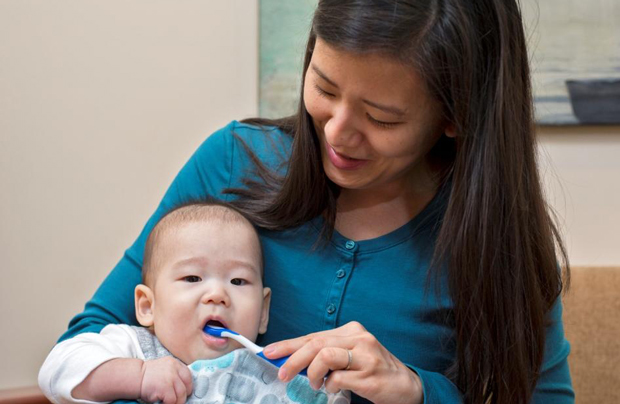

The University of Hawaiʻi at Mānoa School of Nursing and Dental Hygiene received federal funding for an initiative to expand the oral health workforce in Hawaiʻi, to meet the needs of keiki 0-5 years of age. The Utilization of the Post-BS 0-5 Years Pediatric Expanded Function Dental Hygiene (EFDH) Certificate Program to Improve Oral Health Outcomes for Infants and Young Children in Hawaiʻi project is a $1.5 million 5-year grant from the Health Resources and Services Administration (HRSA) of the U.S. Department of Health and Human Services.
The Department of Health’s 2016 Hawaiʻi third grade surveillance report revealed that 7 out of 10 third graders (71 percent) experienced tooth decay, with 22 percent having untreated decay. In addition, more than 60 percent of children lacked dental sealants, with greater disparities noted based on income, race/ethnicity and geography. The Pew Charitable Trust gives Hawaiʻi a grade of “F” for lack of a dental sealant program.
The project goal is to increase the dental workforce serving children 0-5 years of age in underserved areas of the state of Hawaiʻi by developing a post-baccalaureate EFDH certificate program for licensed dental hygienists, and to increase the bachelor’s prepared student’s knowledge and comfort in providing pediatric dental hygiene services to the community. UH Mānoa’s Hawaiʻi Keiki: Health and Ready to Learn Program in partnership with the Department of Education will participate with sites providing access to oral health services and education.
The UH Mānoa School of Nursing and Dental Hygiene currently offers a 4-year baccalaureate degree in dental hygiene. The School graduates 20 students per year and educates 80 percent of the dental hygiene workforce in the state.
“As the state’s leader in dental hygiene education, we are in a unique position to create an innovative program that is not currently offered in Hawaiʻi, to address the growing oral health needs of our youngest population of children” said Mary G. Boland, dean of the School of Nursing and Dental Hygiene. “Our nursing and dental hygiene departments have partnered together and worked closely with the dental community to develop a certificate program that will help advance the education of local dental hygienist and will also help thousands of children.”
About the Expand Function Dental Hygiene certificate program
The two-semester EFDH certificate program will recruit recent dental hygiene graduates from disadvantaged backgrounds and those from neighbor islands, and will provide academic and tuition support. The project will graduate 15 EFDH certificate students by the summer of 2022.
Graduates of the EFDH certificate program will be prepared to work in community settings where there are documented pediatric dental health concerns, especially those living in dental underserved areas. The curriculum will include developmental, social and behavioral instruction with an emphasis on dental education, assessment, diagnosis and delivery of preventive services to young children in underserved communities.
“With over 25 years as a pediatric advanced practice registered nurse I have seen first-hand the long-term effects of early childhood dental disease. This program is important because we have identified intervention methods of bringing oral assessment to the children and referring them to a dentist for additional services” said principal investigator Deborah J. Mattheus, assistant professor at UH Mānoa Nursing. “Working closely with Kristine Osada, UH Mānoa Dental Hygiene department chair, we will revise the current curriculum to increase pediatric content for dental hygiene students, offer the continuing education EFDH certificate program for licensed dental hygienists, and increase the number of children receiving dental services throughout our State.”
The project will begin on July 1, 2017 and the first certificate students will begin classes in August 2018. Dental hygienist interested in the EFDH certificate program should contact Deborah Mattheus by email or call (808) 956-8426.
—By Desiree Uyeda

